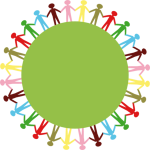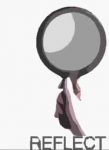
However, that changed last month. Lila told of a company-wide event where she witnessed the leader welcoming a young, new, and nervous employee in a kind and genuine manner. It happened as people were leaving – an interaction between just the two of them. It was really random that Lila happened to be standing nearby and saw it happen. Watching that 30 second encounter completely changed her perception of the leader, turning her into a real fan.
What is interesting to me is how something so seemingly minor, radically shifted Lila’s thinking about the guy.
Sometimes little things make the biggest impression.
Would love to know what kind of leadership behaviors move you from being neutral to an enthusiastic supporter. Leave a comment below or shoot me an email at laura@laurawolfephd.com
Who doesn’t love a good developmental framework?

Another worthy of mention is Bennett’s Developmental Model of Intercultural Sensitivity or DMIS.
The DMIS is a framework for considering the evolution of understanding cultural differences. It is a scale comprised of these six steps:
1. Denial – your culture is the only culture
2. Defense – your culture is the best; others are inferior and stereotyped
3. Minimization – you are aware of differences but dismiss them because ‘we are all the same’
4. Acceptance – you recognize differences and are actively trying to learn more about other cultures
5. Adaptation – you use empathy to understand the viewpoint and experiences of other cultures
6. Integration – you deeply understand more than one culture and each is part of your identity which is continuously developing
Over the years, I have become more interested in learning of and understanding other cultures and now realize it is an ongoing process and that I’ll always be a student. The DMIS gives me some perspective as to where I am along this journey.
A final thought: As the world grows smaller and our communities and workplaces grow more diverse, understanding cultural differences is more and more important to career and leadership success.
Does the DMIS resonate with you? Do you have a favorite developmental continuum? Would love to know what you’re thinking. Comment below or shoot me an e-mail at laura@laurawolfephd.com.
Thanks for reading.
Do you know you?

Unfortunately, most people are so busy cramming each day with work, family, leisure, and life-maintenance tasks that we rarely take the time to reflect on who we really are right now.
Many of us look back at ourselves in high school and college, or during our twenties or thirties and have a laugh or think of that gospel lyric ‘thank God I’m not like I used to be’.
Wouldn’t it be wonderful to know your current self so that in twenty years you don’t reflect on this time and cringe? The good news is, that with awareness, you can make changes to start living and working more as the person you hope to be. However, Daniel Goleman does warn us to not become obsessed with knowing ourselves.
But, how do you get to know you? Fortunately, feedback is all around.
A shift in perspective about daily encounters is one way to gather feedback. Think about your interactions and relationships with friends, family, co-workers, employees, customers, grocery store cashiers, your postman, etc. Monitor how they react to you as therein are clues. Defensive behavior, excuses, and more may also provide insight.
Another way to get information is to ask people what they think. Others may not be comfortable giving feedback about your perceived weaknesses but usually will share with you perceived strengths. Being clear on strengths is just as valuable as clarity around our weaknesses. A way to put a little structure into this is to do your own version of the Reflected Best Self exercise.
Traditional feedback includes the formal performance discussion at work and also data from personality inventories or 360 degree feedback instruments. Reliable and valid assessments provide another snapshot of you. If your employer does assessments, ask to participate. If not, consider finding a coach that provides these services.
Self-awareness is an ongoing process worthy of consideration every so often.
What techniques do you use to know yourself? Share your thoughts in the comments below.
Growing College Kids
H
1.A recent Gallup poll that examined the relationship between college experiences and life after graduation found that what mattered most to ending up engaged at work and having a sense of well-being was real support from faculty / mentors and experiential learning (i.e., projects, internships, extracurricular activities/organizations) while in school. Sadly, only 3% of those surveyed strongly agreed that all of these were part of their college experience.
2. Research by Katherine Milkman, Modupe Akinola, and Dolly Chugh found that when prospective grad students reached out to tenure-track faculty for a meeting, the requests of women and minorities were ignored by faculty at a higher rate than the requests coming from men. Interestingly, the bias against women and minorities was greater in higher paying disciplines and at private institutions. They found little discrimination in the humanities, more discrimination in the natural sciences, and much discrimination in business schools.
If we generalize the Gallup research mentioned above to grad students, this difficulty women and minorities experience establishing a mentoring relationship is even more troubling.
3. Speaking of business schools, gender, and careers, research by Laura Kray examines why women may opt out of high-paying business careers. In an interview on NPR’s Morning Edition, she shared her findings about b-school students saying “men tend to have more lenient ethical standards than women, and secondly, that negotiators are more likely to tell a blatant lie to a female counterpart than a male counterpart.”
This is a fascinating study and it would be interesting to know if the gender differences in ethical standards and behavior are true for business school faculty as well. I’ve written previously about ethical behavior while in college and believe it has many long-term implications.
Finally, (disclaimer: it’s my alma mater) what a fantastic way to develop college students – Earl Leonard, a UGA alum mentors students in UGA’s college of business.
Does this research reflect what you are seeing in the universities you care about and with the college kids in your life? Would love to hear your thoughts on this.
- « Previous Page
- 1
- …
- 13
- 14
- 15
- 16
- 17
- …
- 31
- Next Page »